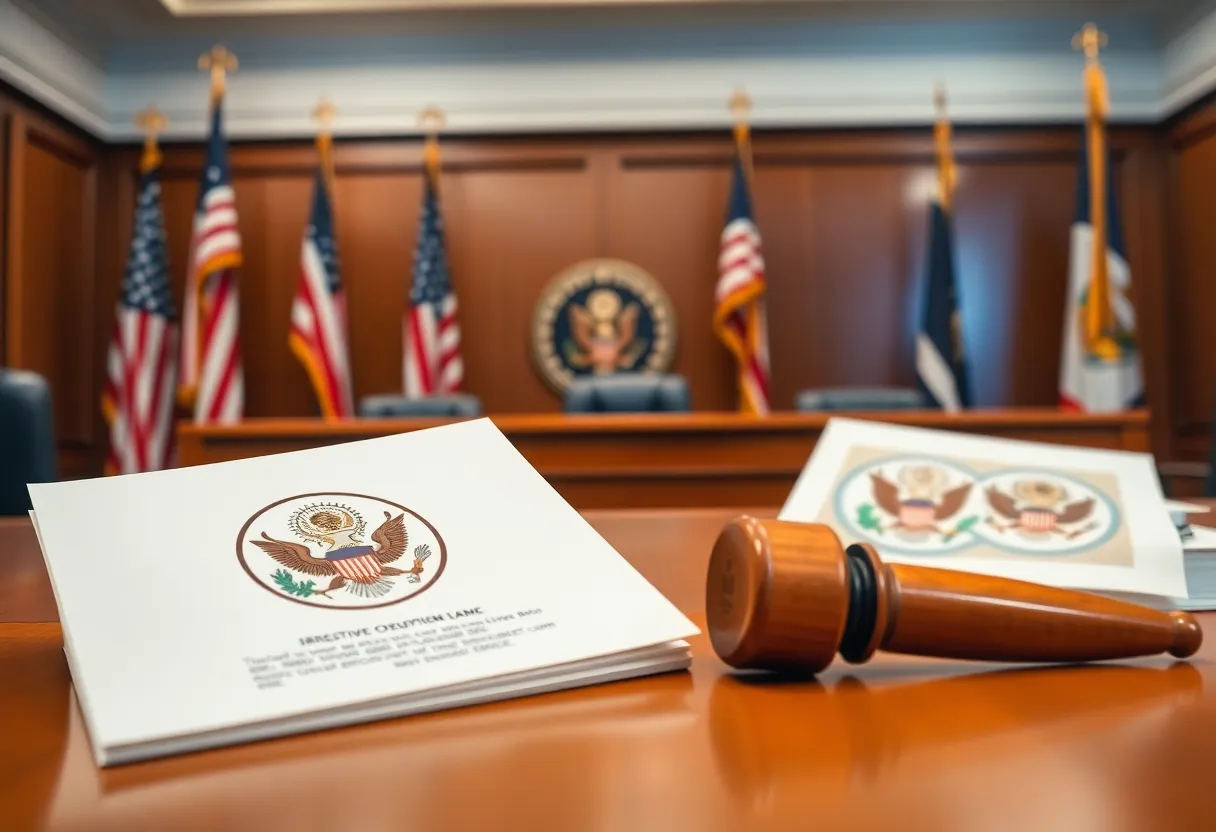

A courtroom fight over the implications of Trump's election executive order.
In a bold legal action, Democratic attorneys general from 19 states have united to file a lawsuit against President Trump’s executive order affecting election processes. The order has led to concerns of unconstitutional overreach, with plaintiffs asserting it infringes on state authority and could disenfranchise voters. The legal battle highlights growing tensions over election integrity and federal intervention in state-managed elections, further igniting the already heated political atmosphere.
In a significant legal move, Democratic officials from 19 states, including Michigan, have come together to file a lawsuit against President Trump’s recent executive order that aims to overhaul election processes in the United States. This executive order has raised eyebrows and stirred up controversy, as many believe it could infringe upon the rights of states to manage their own elections.
The lawsuit is not just a minor disagreement; it asserts that Trump’s executive order constitutes an unconstitutional invasion of state authority. The filing marks the fourth legal challenge against the president’s directive, showcasing a growing unease among Democratic leaders regarding the implications of these changes. The plaintiffs are requesting the court to halt requirements that mandate documentary proof of citizenship when registering to vote and the stipulation that all mail-in ballots must be received by Election Day.
State attorneys general, committed to defending democracy, argue forcefully that the executive order exceeds the president’s constitutional power. They describe the new requirements as unconstitutional, antidemocratic, and frankly, un-American. This is quite the controversy simmering on the political stove!
On the flip side, the White House spokesperson has branded these proof-of-citizenship requirements as mere common sense. They dismiss the Democratic objections as irrational, indicating a clash of perspectives that is increasingly common in American politics. The president’s executive order claims that the nation has failed to enforce basic election protections effectively.
However, election officials across the board maintain that recent U.S. elections have been among the most secure in history. There have been no credible reports of widespread fraud, contradicting the claims that form the backbone of Trump’s directive. Critics point out that instances of illegal voting by non-citizens are incredibly rare, with studies backing up the claim.
One of the most concerning aspects of this executive order is the potential risk to states’ federal funding. If election officials do not adhere to the new requirements regarding mail ballots and proof of citizenship, they might find their budgets affected, adding another layer of urgency to this legal battle. For many states, this is more than just about laws; it’s about resources and abilities to conduct fair elections.
The lawsuit was submitted to the U.S. District Court in Massachusetts, representing voices from states including Arizona, California, New Jersey, and more. The suit emphasizes the concerns that millions of eligible Americans might struggle to provide the necessary documents to register. Notably, the executive order fails to recognize birth certificates as valid proof of citizenship. Tough luck for those who might not have all their paperwork in order!
In Michigan, Attorney General Dana Nessel states that the president’s move disrupts state elections, while her colleagues in New York and California express similar sentiments. They describe the executive order as an authoritarian power grab and a sweeping imposition of voting restrictions that could disenfranchise voters, especially among historically marginalized groups.
David Becker from the Center for Election Innovation & Research argues that this order signifies a federal takeover of state election authority. In Michigan specifically, recent elections showed just 15 potential cases of non-citizen voting out of a whopping 5.7 million votes cast, illuminating the stark reality of the situation.
As this lawsuit unfolds, it reflects the ongoing contentious landscape of U.S. electoral politics. With legal battles becoming a prominent avenue for contention, where will this ultimately lead us? Only time will tell, but for now, lawmakers from both sides are gearing up for a fight that could reshape the future of elections in America.
News Summary Buchanan, Michigan, will receive $2.8 million in grants from the Michigan Economic Development…
News Summary U.S. Senator Gary Peters has proposed the Preventing Power Outages Act to enhance…
News Summary Michigan has introduced a redesigned Unclaimed Property website to assist residents in locating…
News Summary On May 13, 2025, Michigan unveiled a new website for its Unclaimed Property…
News Summary Three sophomores from the Hope College men's tennis team, Cooper Nugent, Ned Curley,…
News Summary On May 15, Plymouth, Michigan will witness a lacrosse showdown as Plymouth High…